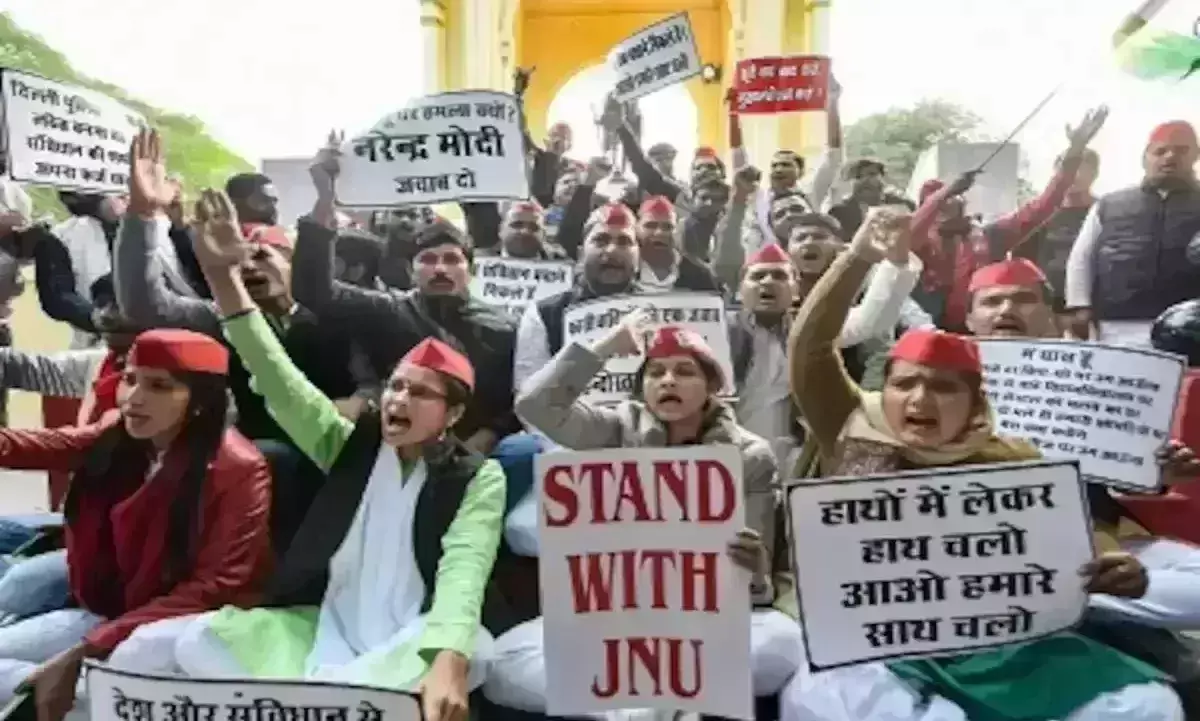
2020: Deepening the divide in universities
text_fields2020 in India opened amidst protests against the Citizenship Amendment Act across the country.
Following the police attack on protesting students of Jamia Millia Islamia and Aligarh Muslim University in December 2019, Jawaharlal Nehru University witnessed a masked mob attack on January 5, 2020. The mob barged into the campus with weapons and assaulted students.
Following the Delhi pogrom in February which killed 53 people, several student leaders including Safoora Zargar, Umar Khalid and Sharjeel Imam were arrested across the year for charges including sedition and instigating violence.
Academicians including retired professor Varavara Rao, DU professor Hany Babu and Anand Teltumbde were arrested for allegations of instigating violence at Bhima Koregaon congregation held on January 1st, 2018 to commemorate the historical battle of Bhima Koregaon.
The disparities of e-learning
Covid-19 was identified in India by the latter half of February 2020. The pandemic unleashed multiple tensions for students across India in 2020 as the nation went into lockdown in March, and schools, colleges, and universities remained shut since then. Education went digital and most Indian schools and universities adopted online means to disseminate lessons. A study conducted by Azim Premji University showed that online education was ineffective in government schools of five states.
Students from marginalized communities continue to face denial of access to digital education. Despite the pandemic and the lockdown, Kerala reopened schools online on June 1st 2020 without ensuring internet availability to all students. The disparity in access to digital learning was exposed when a 14-year-old girl named Devika Balakrishnan died by suicide in Malappuram. The ninth-grade student did not have a smartphone or internet connection at home. The Chief Minister later claimed that Devika's suicide was not the fault of the education department.
Pandemic and students' health
The suddenly enforced lockdown, which pushed students off their hostels and universities back into their homes did not come easy. Several studies conducted pointed to a marked increase in levels of anxiety and depression, from the lack of interaction with peers, locked in with toxic or abusive families, and the stress of keeping up with classes online.
The pandemic also exposed the state of the health infrastructure not just in the rural areas, but inside the nation's top universities. In August, a fifth-year PhD student from the University of Hyderabad lost his life following the university health centre being unable to diagnose and shift him to a proper health care facility effectively.
Fellowships and scholarships
In Universities, delayed disbursement of central fellowships left research scholars in the country in a dismal situation. Undergraduate and postgraduate scholarship holders did not receive the merit- cut scholarship amount in certain universities.
Meanwhile, the central government decided to implement a single scheme instead of post-matric scholarship for SC/ST/OBC students which drew widespread criticism. Dis-investment into public-funded education, started earlier, strengthened as revealed by Ramesh Pokhriyal's statement in August that all higher educational institutions must aim to be autonomous by 2035.
In November 2020, Aishwarya Reddy, a second-year BSc Mathematics student at Delhi's Lady Shri Ram college died by suicide in her home because of not getting scholarships or proper access to a laptop for studies. Aishwarya's classmates claim that she had approached college administration many times regarding scholarships.
"My family has been spending a lot of money on me. I am a burden for them. My studies are a burden. But I cannot live without my studies. I have been contemplating this for days. I think that suicide is my only resort." These are the final words of Aiswarya Reddy, a BSc student who committed suicide due to lack of access to online gadgets and scholarship. These words will reflect the Indian education system in 2020.
National Education Policy 2020
As the country tackled a pandemic, the Centre in July passed the exclusionary New Education Policy unilaterally with no discussion in parliament and despite criticism which amongst other changes proposes multiple exit points in higher education, discontinuation of MPhil, a single regulatory body for higher education and focus on Sanskrit and Indian languages.
Reservations for the deserving
2020 witnessed a showdown for improper implementation of reservation policy across educational institutions in India. EWS reservations were prioritized over the existing reservation policy. Students of IIT Bombay filed an RTI petition and revealed that among all the applications received between the five years, only 1.8% of candidates were from Scheduled Tribe category, 10.7% from Scheduled Caste and 21.8% were from Other Backward Castes. Official data received under the Right to Information Act revealed that 11 out of 26 departments in IIT Bombay admitted zero candidates as PhD scholars from ST category from 2015-2019.
Meanwhile, Hyderabad University is witnessing a relay strike by All India Other Backward Caste Students Association (AIOBCSA) since December 24, 2020, against denial of PhD and MPhil seats for OBC students in the campus. In an interview with Madhyamam, students alleged that university administration is arrogant to OBC students' demands which includes action as per NCBC report, 27% of reservation for OBCs etc.
And in case of OBC reservations in the All India Quota of medical seats, though the Madras High Court recommended the implementation of OBC reservations. It was not implemented by the Centre citing lack of time.
Exclusionary examinations
Entrance examinations to several institutions spanning across disciplines were conducted during the pandemic. However, these exams were rendered inaccessible to students from marginalised communities and geographical locations due to lack of sufficient test centres and public transport facilities amidst great risk to their well-being.
The University of Hyderabad, for one, removed their only centre in the North East less than a week before the exam date, leaving Guwahati to be the only centre in the region. Several of these exams also clashed with each other, and the annual National Eligibility Tests (NET), forcing students to choose between them.






















